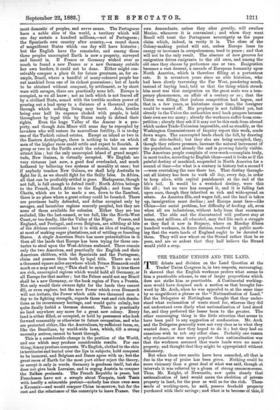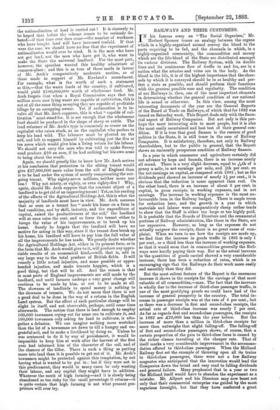THE TRADES' UNIONS AND THE LAND.
THE debate and division on the Land Question at the Trades' Union Congress is, in two respects, encouraging. It showed that the English workman prefers what seems to him a practicable scheme, to one of larger proportions which does not strike him as practicable. A Continental working- man would have despised such a motion as that brought for- ward by Mr. Arch, when he was appealed to at the same time by so magnificent a phrase as the "Nationalisation of Land." But the Delegates at Nottingham thought that they under- stood what reclamation of waste stood for, whereas they did not understand even dimly what nationalisation of land stood for, and they preferred the lesser boon to the greater. The other encouraging thing is the little attention that seems to have been paid to any suggestion of confiscation. Mr. Arch and the Delegates generally were not very clear as to what they wanted done, or how they hoped to do it ; but they had no conscious wish to rob any other class. Probably one reason why reclamation was more popular than nationalisation was that the workmen assumed that waste lands were no man's property, and thought that they might be appropriated without dishonesty.
But when these two merits have been conceded, all that is due in the way of praise has been given. Nothing could be more visionary than a great deal of what was said, though at intervals it was relieved by a gleam of strong common-sense. Thus, Mr. Knight, of Newcastle, saw quite clearly that nationalisation of land would mean the abolition of private property in land, for the poor as well as for the rich. Thou. sands of working-men, he said, possess freehold property purchased with their savings ; and what is to become of this, if the nationalisation of land is carried out ? It is sincerely to be hoped that before the scheme comes to be seriously de- bated—if that time ever does come—the number of workmen who have bought land will have increased tenfold. If that were the case, we should have no fear that the experiment of nationalisation would ever be tried. It is the men who have not got lan3, not the men who have got it, who want to make the State the universal landlord. For the most part, however, the speeches wanted this healthy admixture of common-place ; and this is as true of those made in favour of Mr. Arch's comparatively moderate motion, as of those made in support of Mr. Rowlands amendment. For example, what is the worth of such a statement as this,—that the waste lands of the country, if cultivated, would yield £100,000,000 worth of wholesome food. Mr. Arch forgets that when a Royal Commission says that ten million acres now lying waste are capable of cultivation, this is not at all the same thing as saying they are capable of profitable tillage by an occupying owner. Yet if reclamation is to in- volve all that Mr. Arch supposes, this is what "capable of cul- tivation" must stand for. It is not enough that the wholesome food should be produced in the shape of sheep or cattle. The land reformer of Mr. Arch's type is commonly as severe on the capitalist who raises stock, as on the capitalist who prefers to keep his land wild. The labourer must be planted on the soil, and left to support himself by cultivating just the five or ten acres which would give him a living return for his labour. We should not envy the man who was told to make Surrey sand produce <210 an acre, if he had nothing but his own arms to bring about the result. Again, we should greatly like to know how Mr. Arch arrives at his conclusion that protection to the sitting tenant would give £87,000,000 more value from the soil of England than is to be had under the system of merely compensating the out- going tenant. Why eighty-seven millions, neither more nor less ? Why not ninety, or eighty, or even eighty-five ? Why, again, should Mr. Arch suppose that the constant object of a landlord is to get rid of an improving tenant? Yet, on his reading of the effects of the Agricultural Holdings Act, this is what the majority of landlords must have in view. Mr. Arch assumes that as soon as a tenant has "made his home on a farm in bad condition, and by skill, industry, and the expenditure of capital, raised the productiveness of the soil," the landlord will at once raise the rent, and so force the tenant either to forego the value of his improvements, or to break up his home. Surely he forgets that the landlord will have no motive for acting in this way, since if the tenant does break up his home, his landlord will have to pay him the full value of all the improvements he has made. We greatly doubt whether the Agricultural Holdings Act, either in its present form, or in the form that Mr. Arch would give to it, will produce any appre- ciable results of an economical kind,—will, that is, add in any large way to the total produce of British fields. It will remedy a little actual injustice, and some possible or appre- hended injustice, and make tenants happier, which is a good thing, but that will be all. And the reason is that in most parts of England improvements are still made by the landlord, and until farmers undergo a very great change will continue to be made by him, or not to be made at all. The slowness of landlords to spend money is nothing to the slowness of tenants. We do not mean that there is not a good deal to be done in the way of a reform in the English Land system. But the effect of each particular change will be slight in itself, and not observable, perhaps, until some time afterwards. The notion that there is land enough to employ 100,000 townsmen crying out for some one to cultivate it, and 100,000 townsmen only asking for land to cultivate, is alto- gether a delusion. We can imagine nothing more wretched than the lot of a townsman set down to till a hungry and un- grateful soil, and to make a livelihood by doing so. Unless he was sentenced to do it by way of punishment, it would be impossible to keep him at work after the harvest of the first year had informed him of the character of the soil, and of the chances of the tiller. There is such a thing as putting more into land than it is possible to get out of it. Mr. Arch's townsmen might be protected against this temptation, by not having what is wanted to be put in ; but if they were not in this predicament, they would in many cases be only wasting their labour, and any capital they might have in addition. Whatever the merit of high farming—and it is slowly being abandoned as too risky for the small percentage it returns—it is :quite certain that high farming is not what peasant pro- prietors will ever try.



































 Previous page
Previous page